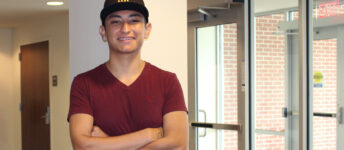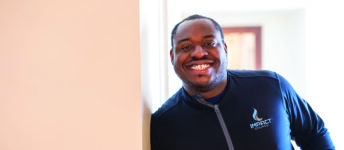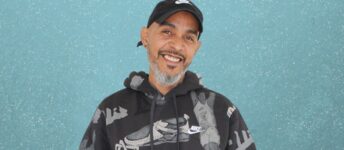Russell
Love, loss, liquor, and the Lord: they’ve all been a part of Russell’s past. They won’t all be a part of his future.
Russell, 63, was born and raised in Brooklyn into a close-knit family. “My sister and I had a great home life, thank God,” he says. His mother was an executive at a national bank. His father was a glazier who did all the restaurant work at Windows on the World in Tower One of the World Trade Center. New York was in his soul.
So was the Christian faith. “I went to Catholic school for eight years as a kid. I was an altar boy and all that good stuff.” But once he reached high school, he started falling away from church and his childhood beliefs.
Russell grew up loving baseball and the Yankees, and he and his father played several softball games each weekend with the recreation league. His father was a pitcher, Russell, a catcher. As a standout player in high school, Russell was drafted by the Florida farm team for the Detroit Tigers. He had dreams of the major leagues until a rival player came sliding hard into home plate, cleats first. “He took me out,” hitting Russell’s thigh and leg as well as the plate.
“It blew my knees out,” and physical therapy could not repair the damage. “That’s when everything went downhill.”
Still, he had hopes that his life could turn out well. He married, but the relationship was short-lived, and they divorced. His work and his life felt like they were going nowhere, so when his parents retired to live near his mother’s sister, Russell moved, too. Virginia Beach had been a regular vacation spot for their family, though it was an adjustment from living in New York City.
Here, Russell built a successful career as an electrician. One day he was working on a tall ladder at a local hospital and didn’t have his voltage tester handy. He asked a coworker if the power was off. He was told it was.
It wasn’t. As he disconnected a wire, Russell was electrocuted. He was zapped 12 feet to the ground and landed on his back. “The doctor said I had a strong heart,” but his legs and back suffered serious nerve damage. He tried returning to his work, but over time his condition worsened. Eventually his doctor recommended spinal surgery:
“Now I have a steel plate in my neck.”
He’s grateful he didn’t end up paralyzed and that he qualified for SSDI disability, but “that’s why my legs are shot and now I have to use a cane.”
Another failed relationship gave him a daughter…and a lot of contention with his ex. His inability to pay child support landed him in jail for almost a year.
But in his mid 40s he met the love of his life, his wife, Judy. Together for 16 happy years, they got a house on the Eastern Shore. He paid the mortgage, she paid the bills. And then the unexpected happened. Judy was diagnosed with liver cancer. Russell and dedicated hospice workers lovingly cared for her while she was sick.
Several years ago, his wife died. “I love her to this day,” he says tenderly.
Fractured family relationships led to a funeral fraught with tension. Allegations of assault led to legal charges and court appearances. And an unexpected discovery led to Russell’s eviction from his home. He was shocked to learn that his name was never on the mortgage. Her family “served me with papers… Take whatever you need. You’ve got 90 days. You’ve got to go.” Unable to find anyone to take Gizmo, Sweetpea, Bootsie, he lost his three dogs “and almost everything else,” in addition to losing his beloved wife and home.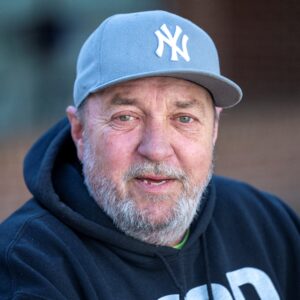
His widowed father in Virginia Beach—“he was my best friend, my buddy”—was able to take him in, but his dad, too, was terminally ill. Russell jumped in to help care for him and support the household. He paid half the expenses to his sister, who was supposed to pay the rent. “It never happened. The landlord gave us an eviction notice and kicked us out.”
When Russell’s sick father went to live with his sister, he went to stay with his “big brother” Mike for a few weeks. Afterward, rented hotel rooms kept Russell from living on the streets, but his father’s death a few months later was especially tough. He had a hard time processing all his pain, loneliness, and anger. Russell had been a recreational beer drinker since high school, but vodka became his “escape.”
“It was just like I’d had it with life. I’d wake up in the morning and have a beer….
I’d have a beer all day long. And then I’d go and get a fifth of vodka and 12-pack of beer, and I would drink and drink and drink.
Then, shoot, when I was out, I’d have to get more.”
Russell never drank to excess around anyone he knew. He never blacked out and always kept his alcoholism “under wraps,” but “yeah, it was bad.” He knew it was no way to live.
Russell had heard about The Union Mission from police officers who were there for his eviction. In late July 2022, he called one night to see about whether he could stay here. The shelter manager suggested that he should arrive at 9 a.m. the next morning. His friend Mike drove him over.
“You see the homeless on TV shows and the shelter is all run down and full of a bunch of bums and stuff like that. But, nah. The Mission is nothing like that. It’s great! I love it here!”
“I got a place to sleep, I got a place to live, three square meals. I put on almost 40 pounds living here. The food is good, Southern cooking, and I like to eat.”
Russell has also stayed sober. “If it weren’t for The Union Mission, I’d probably drink myself to death. I was a full-blown alcoholic, but it’s been 11 months since I had a lick of beer.” He’s had plenty of opportunities to go and sneak a drink,” he says, but “I don’t miss it. And I thank them for that. They showed me the way, because the booze wasn’t doing nothing for me.”
The Mission’s spiritual focus has helped Russell find “a new outlook” on his life.
“The morning devotions, chapel on Wednesdays, services on Sunday morning sometimes. Since I’ve come here, my faith’s been reignited. This place just brought it back out of me.”
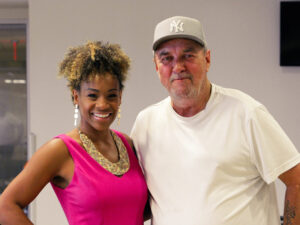 Here at the Mission, Russell has been setting goals and working toward them. “I’m not idle.” He plugged in with the Glascow Health course by Dr. Eiesha Williamson on family, fatherhood, and building better relationships. Now he says his interactions with his 25-year-old daughter are stronger than ever.
Here at the Mission, Russell has been setting goals and working toward them. “I’m not idle.” He plugged in with the Glascow Health course by Dr. Eiesha Williamson on family, fatherhood, and building better relationships. Now he says his interactions with his 25-year-old daughter are stronger than ever.
He’s thankful to have been able to improve his overall health. The doctors at the on-site Sentara Community Care Center helped him not only with routine medical care, but with a diagnosis of depression and treatment options that have helped him overcome. “I totally changed. I totally flipped…. Now I get up and say ‘Good morning’ to everyone. I go to sleep early. I never used to do that.”
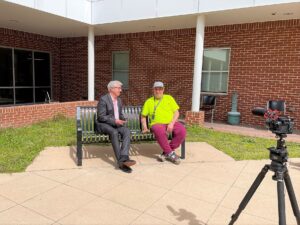
Russell’s also joined RECLAIM, the Mission’s transitional program for men, where he has his own room and is working to rebuild his shattered credit rating. He’s also on the candidate list to qualify for a subsidized rent apartment through Norfolk’s Tenant-Based Rental Assistance program. Russell looks forward to getting his own place, going to AA meetings, staying sober, and living independently.” “It’s just a matter of time. I’m hanging in there.”
He even told a visiting WAVY-TV reporter about life at the Mission. “Ever since I’ve been here, anything I want or I need or I feel, they say, ‘C’mon down, no problem! We’ll take good care of you.’ I can’t ask for any more.”
“This place, everybody here is awesome, totally awesome! I’d recommend The Union Mission for anyone who’s homeless.” He’s grateful for his time here…and for “the people that give, give, give, give!” He urges them to continue.
“Keep donating, because look how many lives it has saved. It saved me!”

